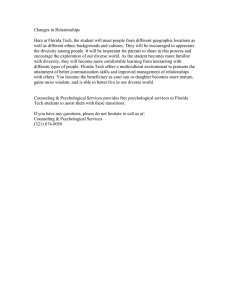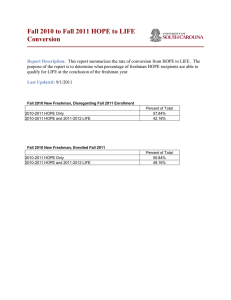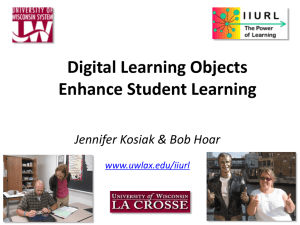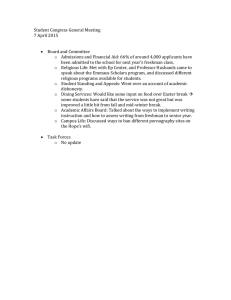Building a Comprehensive First Year Student Success Program
advertisement
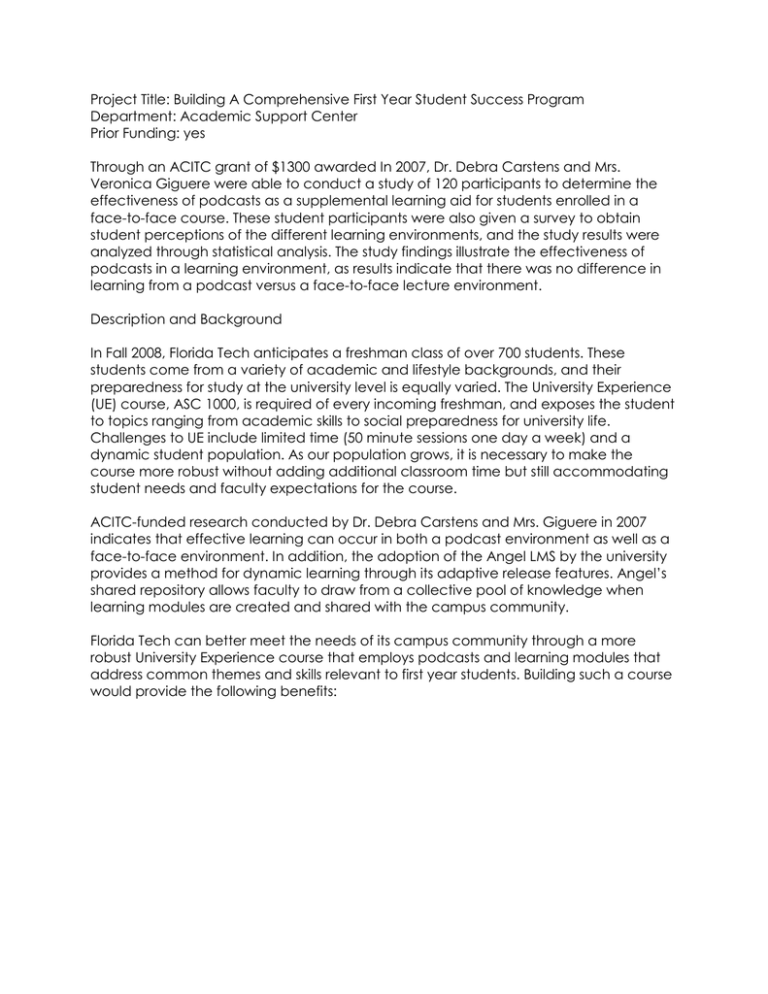
Project Title: Building A Comprehensive First Year Student Success Program Department: Academic Support Center Prior Funding: yes Through an ACITC grant of $1300 awarded In 2007, Dr. Debra Carstens and Mrs. Veronica Giguere were able to conduct a study of 120 participants to determine the effectiveness of podcasts as a supplemental learning aid for students enrolled in a face-to-face course. These student participants were also given a survey to obtain student perceptions of the different learning environments, and the study results were analyzed through statistical analysis. The study findings illustrate the effectiveness of podcasts in a learning environment, as results indicate that there was no difference in learning from a podcast versus a face-to-face lecture environment. Description and Background In Fall 2008, Florida Tech anticipates a freshman class of over 700 students. These students come from a variety of academic and lifestyle backgrounds, and their preparedness for study at the university level is equally varied. The University Experience (UE) course, ASC 1000, is required of every incoming freshman, and exposes the student to topics ranging from academic skills to social preparedness for university life. Challenges to UE include limited time (50 minute sessions one day a week) and a dynamic student population. As our population grows, it is necessary to make the course more robust without adding additional classroom time but still accommodating student needs and faculty expectations for the course. ACITC-funded research conducted by Dr. Debra Carstens and Mrs. Giguere in 2007 indicates that effective learning can occur in both a podcast environment as well as a face-to-face environment. In addition, the adoption of the Angel LMS by the university provides a method for dynamic learning through its adaptive release features. Angel’s shared repository allows faculty to draw from a collective pool of knowledge when learning modules are created and shared with the campus community. Florida Tech can better meet the needs of its campus community through a more robust University Experience course that employs podcasts and learning modules that address common themes and skills relevant to first year students. Building such a course would provide the following benefits: Benefits to Students, Department, and Faculty Student Benefits 1) Ability to tailor UE based upon individual experiences and prior knowledge base 2) Ability to progress through learning modules at one’s own pace 3) Exposure to a wider range of topics relevant to the first-year student experience UE Instructor Benefits 1) Centralized location for materials, gradebook, and student tracking 2) Uniform reusable materials and assessment tools for a variety of topics relevant to the first-year student experience 3) Increased time in class for dynamic discussion, guest speakers, and student interaction Florida Tech Faculty Benefits 1) Access to a repository of tools and learning modules relevant to freshman learning 2) Ability to work with and engage a better-prepared freshman class Expected Goals and Outcomes Revitalizing the University Experience course to utilize podcasts and the adaptive learning features of the Angel LMS will provide Florida Tech with a dynamic and current first-year experience course that better meets the challenge of teaching to a growing and diverse freshman class. A more involved University Experience course will meet the needs of the first year students, allowing them to customize their learning based upon prior experiences and academic and social needs. Furthermore, providing instructors with a complete and robust online course will assist during their summer training as well as ensure that all students receive a relatively consistent in-class experience. With funding, these changes to University Experience can be implemented as soon as Fall 2008 and Florida Tech faculty can begin to use these modules for the same semester. Student reaction to the change and diversity of the course will be assessed at midterm and end of term through the course evaluation administered to each section. Itemized Estimate of Expenses Registration Fee – Institute for First Year Seminar Leadership - $590 Travel Expenses - $400 Provides training for University Experience coordinator with regard to current topics and technologies used in nationally-recognized first-year experience courses Software Purchases – Sony SoundForge Audio Studio v.9 - $56.85 (www.cdw-g.com) Provides professional sound editing capabilities for creating audio for podcasts Software Purchases – VARK Intranet Software, V3 - $423.22 (www-vark-online.com) Provides learning style survey for campus use by faculty for individual classes, used as standard assessment in University Experience environment Student Stipend - $900 Provides funding for two undergraduate students to assist in authoring, editing, and producing short podcasts to be used in the University Experience course beginning Fall 2008
